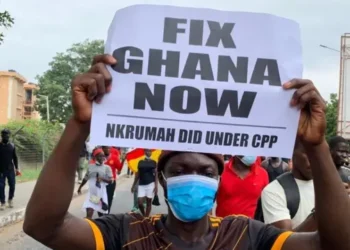Ghana is making remarkable strides towards achieving Universal Health Coverage (UHC) for all its citizens. With a strong commitment to healthcare and access to essential services, Ghana is on track to ensure that everyone can obtain the health services they need without suffering financial hardship.
The Chief Executive of the National Health Insurance Authority (NHIA), Dr. Da-Costa Aboagye, has assured that Ghana is likely to attain UHC before 2030. This ambitious goal reflects the government’s dedication to health equity and improving the well-being of its population.
One of the key innovative policies under the universal health coverage initiative includes the introduction of preventive healthcare measures. Dr. Aboagye revealed that these measures will soon become part of the National Health Insurance Scheme (NHIS) claim package, allowing every Ghanaian on the scheme to visit the hospital for medical check-ups on their birthdays.
This proactive approach is designed to detect diseases early, improve life expectancy, and reduce the cost burden on both patients and the country.
“For over our 20-year history, the NHIS has primarily focused on curative services. This means that people only go to the hospital when they are sick.
“With the rise of non-communicable diseases like hypertension, which significantly contributes to our claims, we want to shift towards a preventive approach.
“Annual health checks for every Ghanaian will help detect diseases early, reduce the overall cost burden, and ultimately improve the health outcomes of our population.”
Dr. Da-Costa Aboagye, Chief Executive of the National Health Insurance Authority (NHIA)
The new preventive measures are set to include checking basic vitals such as blood sugar levels, blood pressure, and body weight. By incorporating these health checks into the NHIS claim package, the NHIA aims to promote a culture of regular health monitoring and early intervention.
Addressing Co-Payments and Enhancing Access to Medicines

Dr. Aboagye also expressed concerns over the issue of co-payments at various health facilities. Co-payments can pose a significant financial barrier for many patients, undermining the goal of UHC. To tackle this issue, the NHIA is implementing several strategies to eliminate co-payments and ensure that patients receive the medicines they need without additional out-of-pocket expenses.
“One of the solutions we are exploring is the government e-pharmacy platform. This platform will enable pharmacies to upload prescriptions, ensuring that medicines are available and accessible to patients. By leveraging technology, we can streamline the distribution of medicines and reduce the financial burden on patients.”
The NHIA is also working on reviewing tariffs and seeking parliamentary approval for an automatic price adjustment mechanism. This mechanism will allow for regular reviews of tariffs based on economic conditions, ensuring that pharmaceutical companies and health facilities receive accurate reimbursements.
By fulfilling their part of the agreement, the NHIA aims to hold health facilities accountable and prevent them from charging patients for services covered by the NHIS.
Achieving UHC is a complex and multifaceted goal that requires collaboration and commitment from all stakeholders. The NHIA is actively engaging with healthcare providers, pharmacies, and the government to ensure that the necessary reforms are implemented effectively. By addressing systemic issues and improving the efficiency of healthcare delivery, Ghana is well on its way to achieving UHC.
Dr. Aboagye emphasized the importance of using systems to monitor and enforce compliance with the NHIS policies.
“We need to use the e-pharmacy platform to make sure that patients are not being charged for services that are covered by the NHIS. By leveraging technology and data, we can enhance transparency and accountability in our healthcare system.”
Dr. Da-Costa Aboagye, Chief Executive of the National Health Insurance Authority (NHIA)
Ghana’s journey towards achieving UHC is a testament to the country’s commitment to improving healthcare access and outcomes for all its citizens.
The introduction of preventive healthcare measures, efforts to eliminate co-payments, and the use of technology to enhance access to medicines are significant steps towards this goal.
With continued collaboration and dedication, Ghana is poised to achieve UHC before 2030, ensuring that every Ghanaian can obtain the health services they need without financial hardship.
READ ALSO: UN Warns Of Escalating Violence And Displacement In Eastern DRC





















